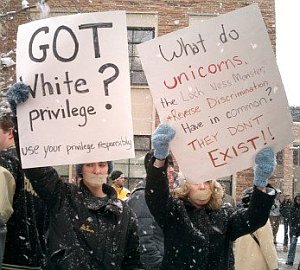What We Aren’t Talking About When We Talk About ‘White Privilege’
By Theresa Warburton and Joshua Cerretti
 We’re white feminists. We aren’t white just because our ancestors were mostly European. We are white because we regularly experience being identified as such by individuals and institutions that systematically favor those who appear white over those who don’t. We aren’t feminists just because we have degrees and teach in Gender and Women’s Studies. We are feminists because we are committed to dismantling the structures that systematically favor men over women, heterosexuals over non-heterosexuals, the rich over the poor, and, amongst many other oppressions, white people over people of color.
We’re white feminists. We aren’t white just because our ancestors were mostly European. We are white because we regularly experience being identified as such by individuals and institutions that systematically favor those who appear white over those who don’t. We aren’t feminists just because we have degrees and teach in Gender and Women’s Studies. We are feminists because we are committed to dismantling the structures that systematically favor men over women, heterosexuals over non-heterosexuals, the rich over the poor, and, amongst many other oppressions, white people over people of color.
 In order to address that oppression, we try to get people to talk frankly about race – never an easy task in a cultural paradigm that has been described as ‘colorblind racism,’ ‘race-evasive,’ and ‘racism without racists.’ Talking frankly about race doesn’t just mean pointing out hostile attitudes and narrow stereotypes based on race, though; it also means being honest about our own experiences as raced beings. It means talking about how we are embedded in racial systems, not disembodied and dispassionate viewers of them. It also means talking about how being against racism doesn’t mean that we don’t say and do racist things.
In order to address that oppression, we try to get people to talk frankly about race – never an easy task in a cultural paradigm that has been described as ‘colorblind racism,’ ‘race-evasive,’ and ‘racism without racists.’ Talking frankly about race doesn’t just mean pointing out hostile attitudes and narrow stereotypes based on race, though; it also means being honest about our own experiences as raced beings. It means talking about how we are embedded in racial systems, not disembodied and dispassionate viewers of them. It also means talking about how being against racism doesn’t mean that we don’t say and do racist things.
It means we need to have a conversation about white privilege.
But before we have that conversation, maybe we need to be clearer about what we talk about when we talk about white privilege—or, maybe what we really need to talk about is what we AREN’T talking about when we talk about white privilege.
What we mean is this: we’ve been doing this long enough to recognize some trends, first in our own reactions to being called out on our privilege and second, to see those reactions play out elsewhere. Therefore, we want to lay out some no-nonsense caveats that we hope can pre-empt some of these reactions, or at least make it so that we can move forward more quickly without having to keep copying and posting pieces of ‘Derailing for Dummies’ to get down to the stuff that lies beyond the defensive reactions.
So, let’s be clear. When we say that we/you have ‘white privilege’:
1. We don’t mean that we/you are intentionally acting in a bigoted way
2. We don’t mean that our/your biology is our/your destiny
3. We don’t mean that we/you aren’t oppressed in some other way
In the simplest way, recognizing one’s privilege is about recognizing that what you think, say, and do is affected by the fact that you have been and continue to be afforded certain unearned privileges on the basis of one or more parts of your identity. So, when you’re called out on your privilege, there’s one sure-fire tactic that you can use to keep the situation as productive as possible—LISTEN.
Chances are, the person isn’t trying to ‘out’ you as a racist, prove that you are stupid, or deny you your right to free speech. Chances are, the person is trying to get you to understand that there is a perspective other than your own and that your perspective is shaped by your experience and therefore cannot be expressed unilaterally or universally.
We know you didn’t ‘ask’ for privilege—but we also know that you can’t just give it up once you recognize you have it. You can’t just think really hard about it for a few hours, days, months, weeks, or even years and then one day stand up, dust yourself off, and yell ‘YES! I’m no longer privileged!’
 Because of this, it’s worth acknowledging that those critical of talking about white privilege are right to say that these discussions alone aren’t going to solve the problem of white supremacy. Of course, it’s also worth acknowledging that nobody ever said they would. Rather, outing our privilege, reckoning with it, and addressing how the privileges that others experience affect us are all important elements for building the sorts of mass movements that will actually be able to challenge and overcome white supremacy, heteropatriarchy, capitalism and the numerous other forms of oppression that structure our lives.
Because of this, it’s worth acknowledging that those critical of talking about white privilege are right to say that these discussions alone aren’t going to solve the problem of white supremacy. Of course, it’s also worth acknowledging that nobody ever said they would. Rather, outing our privilege, reckoning with it, and addressing how the privileges that others experience affect us are all important elements for building the sorts of mass movements that will actually be able to challenge and overcome white supremacy, heteropatriarchy, capitalism and the numerous other forms of oppression that structure our lives.
These challenging conversations are necessary because, in the age of intensive plurality and diversity, any movement worth being part of is going to involve organizing across many forms of difference. Notice how we say ‘across’ and not ‘in spite of.’ We say that because it’s likely that most people in these movements will have at least one identity that provides systematic, unearned advantages – whiteness, maleness, heterosexuality, citizenship, able-bodiedness, etc. – and those same people will have other identities that provide systematic, unearned disadvantages. We need to recognize that the vast majority of people are both oppressed and oppressive in different ways, in different contexts, and in different moments.
Therefore, if you are on the receiving end of a question, suggestion, or rant about your white privilege, don’t get offended. Nobody’s accusing you of Klan membership, a biologically determined inability to fight injustice, or being The Man/Big Brother/Whitey/Hegemon. And nobody who’s pointing out the way privilege over-determines many of our ideas, opinions, and desires thinks that a conversation with you about privilege will end state and interpersonal violence, equalize the wealth, and get the land back into the hands of Indigenous peoples.
You’re receiving this talk about white privilege because we want to work together to rid this world of the various oppressions that make life worse for so many people. Overcoming the challenge that these forces present will require working across multiple forms of difference, and to do this we mustn’t forget that the challenges lie not in difference itself, but in the oppressions structured around difference. As Audre Lorde said so beautifully…
[…]it is not the differences between us that tear us apart, destroying the commonalities we share. Rather, it is our refusal to examine the distortions which arise form their misnaming, and from the illegitimate usage of those differences which can be made when we do not claim them nor define them for ourselves.
As feminists, we don’t want to participate in the use of oppressive force or reproduce any system that legitimates this force. As white people born in the U.S. who work at a university, we’ve benefited enormously from this very system we oppose. These contradictions will not be resolved in silence and, unless we work on recognizing and addressing them, we don’t expect for it to be easy for anyone who hasn’t shared our experiences to work with us.
We’re on a journey, a trip with a destination that we don’t expect to reach tomorrow; a journey towards understanding how experiences of privilege turn into flat tires and roadblocks on the trips we want to take away from ugly histories of oppression.
So, next time somebody invites you along for the ride, don’t wave them along—hop on.
______________________________________
 Josh Cerretti works at the intersection of feminist, queer, anti-racist, anti-war, and anti-capitalist movements. He teaches Global Gender Studies at the University at Buffalo and is involved in many local organizations striving for a more just city and world.
Josh Cerretti works at the intersection of feminist, queer, anti-racist, anti-war, and anti-capitalist movements. He teaches Global Gender Studies at the University at Buffalo and is involved in many local organizations striving for a more just city and world.
 Theresa Warburton is learning how to build solidarity across difference, making solidarity a core concern of her writing and organizing. She is also a teacher and PhD candidate in Global Gender Studies. She believes in the radical potential of the imagination in creating other possible worlds.
Theresa Warburton is learning how to build solidarity across difference, making solidarity a core concern of her writing and organizing. She is also a teacher and PhD candidate in Global Gender Studies. She believes in the radical potential of the imagination in creating other possible worlds.




76 Comments